TweetTone shows positive online sentiments for African ICT, tech, internet, business
Ever wonder why that Tweet you deemed innocuous led to a backlash? Lymbix, a company working to better understand “sentiment analysis” has products that analyze written communication for emotional intent. The company currently offers two products: ToneCheck (used to prevent the sending of negative email) and TweetTone (used to analyze the emotion behind Twitter conversations). TweetTone is intended to be used in real-time by marketers to monitor the public sentiment behind their brands. However, a free service can also be used to gauge the tone of conversations around a certain keyword.
Based on recent Tweets from June 2-4, many African themes generate positive online conversation. A few examples are included below, but feel free to explore the tool for yourself.
“Africa ICT” evokes friendly and amusing conversation:
“Africa internet” generates enjoyable conversation, although there is a hint of uneasiness:
“Africa tech” is mostly positive (especially amusing), but 1/3 of conversations are deemed negative:
“Africa business” is over 75% positive:
“ict4d” takes the cake when it comes to contentment:
Of course, few algorithms are perfect. TweetTone appears fairly accurate over a large sample. Individually, however, emotion can be confused. Case in point is the recent @oafrica Tweet, “22 African ICT, mobile, broadband, and computer stories from the past 9 days http://bit.ly/li6fa0 #ict4d #africantech“. TweetTone classifies this middle-of-the-road Tweet as sad. I have no idea as to why. A similar Tweet mentioning genocide has been classified as sad, simply due to the inclusion of that word. The Tweet itself lacks much of a stance. Keep in mind:
- There’s no “right way” to measure sentiment. Some statements can have both positive and negative emotion, but end up ambiguous.
- TweetTone is only successful with the English language.
- The goal of TweetTone is to both be accurate with what a sentence should mean and agreeable as to how human readers interpret.






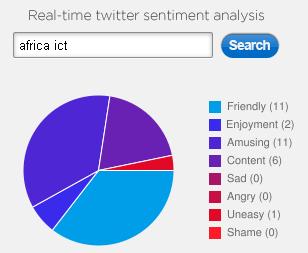
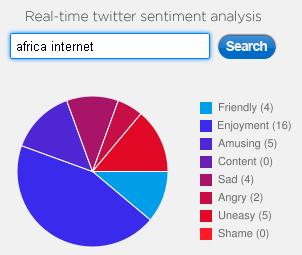
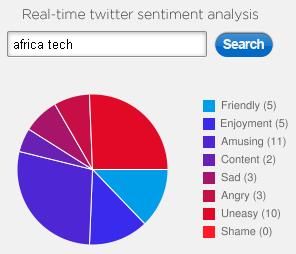
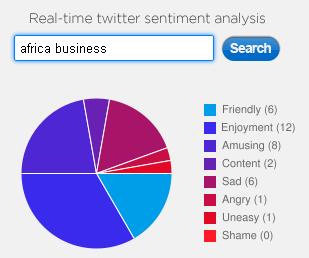
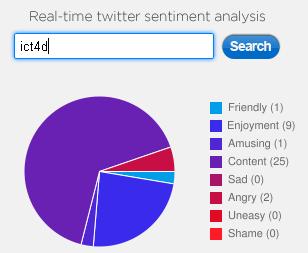






 Twitter
Twitter Facebook
Facebook Pinterest
Pinterest
Very creative!
Great article 🙂
Thanks for using our tool.. just touching on a couple of your ‘accuracy points’
Often people say sentiment is very inaccurate, mostly because there is a misunderstanding with respect to the capabilities of sentiment. First off, there’s no “right” way to measure it. There are some different schools of thought when it comes to how to directly measure the effectiveness of sentiment analysis, but there has yet to be a standard. Mostly because of our human subjectivity that comes into play. You feel differently about something than I do (just the way that we see things differently). A simple example of this would be to consider talking about a new pen that you bought the other day to a friend; “Man, this pen is comfortable but its not good to write with”. Here we have 2 different sentiments expressed in one simple statement. So then asking, if you were were to tag this as positive, negative, or neutral.. what would it be? Eventually if you ask enough people you’ll find that the statement is too ambiguous to determine whether it is in fact a positive or negative statement.
That’s where we come in; we’ve created the first ever engine that can measure the levels of subjectivity that could arrise in a given statement, to through off the “accurate” judgement of the sentiment. Of course, its helpful to still know which is mostly likely the “best guess” of the sentiment, but when it comes down to actually using this, you might consider it to be less impactful than a statement that is a lot more clear. Lymbix calls this “clarity”.
However.. TweetTone was a prototype and we never included this clarity measurement.. we’ll be updating it for better results!
Thanks for the extra insight and valuable (and fun!) tool. I imagine the interest in sentiment analysis will only grow as you tweak engine.